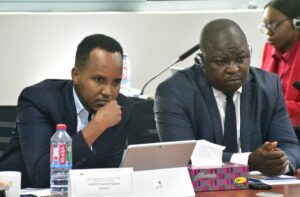ACBF and partners working to build capacity of Africa tax officials through digital training

The capacity of tax officials has for a long time been cited as one of the shortcomings in revenue mobilisation across Africa. The problem of illicit financial flows through tax avoidance and evasion have continued to erode the revenue base of most African countries and one of the factors accounting to that has been noted as the inadequate capacity of tax officials.
The African Capacity Building Foundation (ACBF) through the African-Finnish Partnerships on Taxation Capacity in Africa (AFP-TCA) Programme is working to strengthen the capacity of selected African governments and pan-African organizations to increase domestic resource mobilization through informed policy-making and effective tax administration.
The AFP-TCA programme, is funded by the government of Finland and the Finnish Institute of Public Management Ltd (HAUS) is responsible for the overall management.
In pursuant of that, a two-day workshop is being held in Ghana from November 20 to 21, 2023, to evaluate and better understand the digital tax training landscape in Africa with the ultimate goal of guiding the development of a tailored online training plan for African tax officials. The workshop was facilitated by tax expert, Ms Nara Monkam.
“We will achieve this by analysing the existing digital tax training landscape, mapping existing players, assessing specific areas where ACBF training could make a significant impact, and formulating a value proposition to shape ACBF’s future training initiatives. The workshop targets tax officials working in tax administration, tax training institution, or tax unit within the Ministry of Finance, or representatives of related institutions,” the ACBF said in communication with Ghana Business News.
According to ACBF, it will be supported to develop the African Capacity Building Academy.
It also indicated that it has identified digital learning in the programme as a key enabler for long-term, cost-effective capacity building, with its increased organisational capacity and tools for capacity building in tax related issues, especially through leadership, digital learning solutions and an improved external communication and advocacy processes.

The ACBF says further that it has improved organizational capacity to operate high quality digital learning processes and pilot taxation and leadership related training content through digital learning solutions.
“As the African Union’s specialized agency for capacity building and given its long experience, ACBF is well positioned to achieve the expected outcome. ACBF does not yet however have a strong presence around taxation and the delivery of digital learning solutions. Furthermore, ACBF will operate in a context where the potential for duplication of efforts is very high because there are several development partners already providing training and technical assistance on taxation,” it acknowledges.
In a presentation at the training, Nissa Gaya of Mauritius Revenue Authority, citing the United Nations Economic Commission for Africa (UNECA) High Level Panel on Illicit Financial Flows (IFFs) indicated that currently Africa is estimated to be losing between $30 billion to $60 billion annually to IFFs.
“Among the sources of IFFs is tax evasion, internal issues, poorly functioning information systems; inefficiency in tax enforcement; corruption; and lack of capacity building in high-risk areas,” she said.
Stating some of the external factors accounting to illicit financial flows, she pointed out the following: aggressive tax planning; tax fraud; harmful tax competition between states and the lack of legal presence of global e-commerce players.
According to Ms Gaya, it is necessary to keep abreast with evolving risks of tax avoidance and evasion and developing commensurate mitigating measures, as well as looking at the taxation of the digital economy or cashless economy, develop dispute resolution mechanisms and keep abreast of live taxation issues more specifically, international tax issues affecting African countries’ taxing rights.
Among other things, she recommended that African countries should embark on the digital transformation of their tax administrations to keep pace with their counterparts on one hand and with taxpayers on the other.
Judy Magu of Kenya’s National Treasury and Planning in sharing her country’s experience in training tax officials, said while online modules are increasingly preferred due to accessibility and flexibility, gaps exist in reaching remote areas with limited Internet access.
“E-learning methods for tax training can be highly effective when tailored to suit different learning styles,” she said, and added that interactive modules which engage learners through quizzes, case studies and simulations, make complex tax concepts more digestible.
She added that live sessions with tax experts also provide real-time insights, Q&A opportunities and discussions on current tax trends.
Ms Magu noted additionally that mobile learning Apps are good tools because these are accessible anywhere and can allow learners to study at their convenience.
“Discussion forums also allow learners to interact and foster collaborative learning environment thus facilitating knowledge exchange and problem solving,” she said.
By Emmanuel K Dogbevi & Kizito Cudjoe
Copyright ©2023 by NewsBridge Africa
All rights reserved. This article or any portion thereof may not be reproduced or used in any manner whatsoever without the express written permission of the publisher except for the use of brief quotations in reviews.
